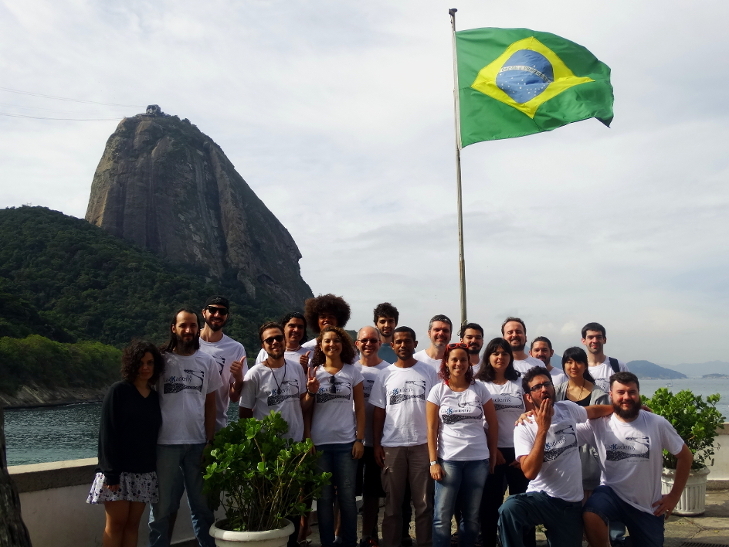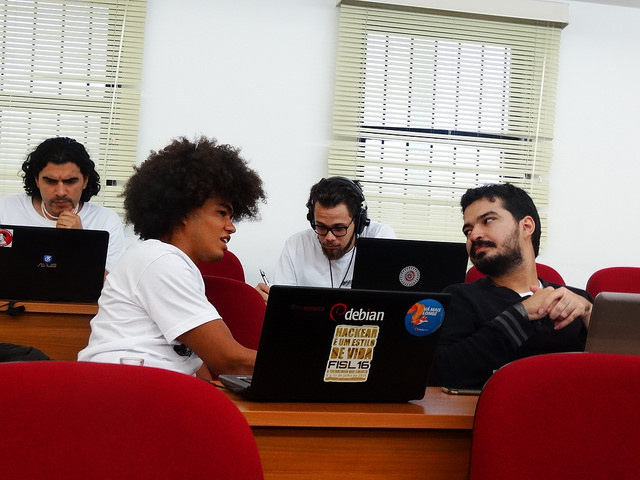
In the end of May, ~20 gearheads from different countries of Latin America were together in Rio de Janeiro working in several fronts of the KDE. This is our ‘multiple projects sprint’ named LaKademy!
Like all previous editions of LaKademy, this year I worked hard in Cantor; unlike all previous editions, this year I did some work in new projects to be released in some point in the future. So, let’s see my report of LaKademy 2016.
Cantor
LaKademy is very important to Cantor development because during the sprint I can to focus and work hard to implement great features to the software. In past editions I started the Python 2 backend development, ported Cantor to Qt5/KF5, drop kdelibs4support, and more.
This year is the first LaKademy after I got the maintainer status of Cantor and, more amazing, it is the first edition where I was not the only developer working in Cantor: we had a team working in different parts of the project.
My main work was to perform a heavy bug triage in Cantor, closing old bugs and confirming some of them. In addition I could to fix several bugs like the LaTeX rendering and the crash after close the window for Sage backend, or the fix for plot commands for Octave backend.
My second work was to help the others developers working in Cantor, I was very happy to work with different LaKademy attendees in the software. I helped Fernando Telles, my SoK 2015 student, to fix the support for Sage backend for Sage version > 7.2. Wagner Reck was working in a new backend for Root, the scientific programming framework developed by CERN. Rafael Gomes created a Docker image to Cantor in order to make easy the environment configuration, build, and code contribution for new developers. He wants to use it in other KDE software and I am really excited to see Cantor as the first software in this experiment.
Other relevant work was some discussions with other developers about the selection of an “official” technology to create backends for Cantor. Currently Cantor has backends developed in several ways: some of them use C/C++ APIs, others use Q/KProcess, others use DBus… you can think about how to maintain all these backends is a work for crazy humans.
I did not select the official technology yet. Both DBus and Q/KProcess has advantages and disadvantages (DBus is a more ‘elegant’ solution but bring Cantor to other OS can be more easy if we use Q/KProcess)… well, I will wait for the new DBus-based Julia backend, in development by our GSoC 2016 student, to make decision about which solution to use.

New projects: Sprat and Leibniz (non-official names)
This year I could to work in some new projects to be released in the future. Their provisional names are Sprat and Leibniz.
Sprat is a text editor to write drafts of scientific papers. The scientific text follows some patterns of sentences and communication figures. Think about “A approach based in genetic algorithm was applied to the travel salesman problem”: it is easy to identify the pattern in that text. Linguistics has worked in this theme and it is possible to classify sentences based in the communication objective to be reached for a sentence. Sprat will allow to the user to navigate in a set of sentences and select them to create drafts of scientific papers. I intent to release Sprat this year, so please wait for more news soon.
Leibniz is Cantor without worksheets. Sometimes you want just to run your mathematical method, your scientific script, and some related computer programs, without to put explanations, figures, or videos in the terminal. In KDE world we have amazing technologies to allow us to develop a “Matlab-like” interface (KonsolePart, KTextEditor, QWidgets, and plugins) to all kind of scientific programming languages like Octave, Python, Scilab, R… just running these programs in KonsolePart we have access to syntax highlighting, tab completion… I would like to have a software like this so I started the development. I decided to develop a new software and not a new view to Cantor because I think the source code of Leibniz will be small and more easy to maintain.
So, if you are excited with some of them, let me know in comments below and wait a few months for more news! 🙂
Community-related tasks
During LaKademy we had our promo meeting, an entire morning to discuss KDE promo actions in Latin America. KDE will have a day of activities at FISL and we are excited to make amazing KDE 20th birthday parties in the main free software events in Brazil. We also evaluated and discussed the continuation of some interesting activities like Engrenagem (our videocast series) and new projects like demo videos for KDE applications.
In that meeting we also decided the city to host LaKademy 2017: Belo Horizonte! We expect to have a incredible year with KDE activities in Latin America to be evaluated in our next promo meeting.
Conclusion: “O KDE na América Latina continua lindo“
This edition of LaKademy had strong and dedicated work by all attendees in several fronts of KDE, but we had some moments to stay together and consolidate our community and friendship. Unfortunately we did not have time to explore Rio de Janeiro (it was my first time in the city) but I had good impressions of the city and their people. I intent to go back to there, maybe this year yet.
The best part of to be a member of a community like KDE is to make friends for the life, people with you like to share beers and food while chat about anything. This is amazing for me and I found it in KDE. <3
Thank you KDE and see you soon in next LaKademy!
Leibniz looks really interesting, but what exactly does it bring of new features, compared to Jupyter or even Cantor itself ?